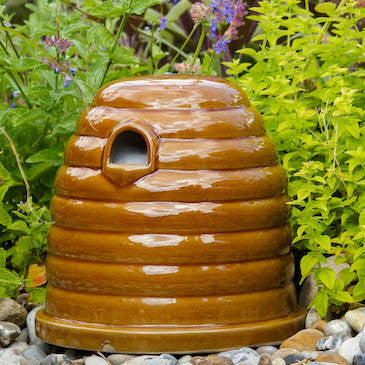No products found
Use fewer filters or clear all
Bee Shelters and Insect Habitats for Healthier Gardens!

Bee Shelters and Insect Habitats lure beneficial pollinators to your garden!
Try a Bee Skep, Insect Hotel or Bee Waterer to attract and promote local populations of bumblebees, mason bees, ladybugs and other good insects. Find cool bug shelters, bee lodges and other handmade garden accessories artfully crafted to promote pollination of fruits, vegetables and flowers at your place.
Bee a friend and help these winged ones thrive! Albert Einstein once said "when the bees go, we go". Maybe- maybe not, but definitely food for thought!
Entice beneficial pollinators to the garden with artful form and functionality. Handmade designs for years of thriving, happy bees and insects! First and foremost, stop using pesticides and always try to plant native species when landscaping. Native flowers actually offer more nectar than hybrids. Orchard bees, leafcutters, bumblebees, ladybugs and many others feed directly from flowers promoting healthier gardens.
Mason bees are an absolute necessity to the ecosystem and unlike others, are a solitary species... the hardest-working pollinator of all. Visiting thousands of blooms daily, masonry bees are the super pollinators of the bunch. It’s actually their sole purpose- well, aside from mating! Fruits, vegetables and flowers flourish when hosting these non-swarming, non-stinging bees around your place. Offering a solitary bee house made for mason bees is a great way to start.
Leafcutter and orchard bees provide invaluable pollination for flowers, fruits, vegetables, even industrial crops. Also non-aggressive, they just do their thing with no disruptions, totally safe around children and pets.
Never to be confused with destructive carpenter bees (we have natural traps for their kind) these species along with honey bees and bumblebees have been all but ignored until recently. It’s a good thing someone took note and got the word out!
Improving garden health and producing larger harvests happens naturally with local bee populations. Entice and encourage residency of mason bees and others with appealing digs! Although deemed insect hotels, the structures are really more permanent, used 11 months out of the year as over-wintering occurs while dormant. From egg to larval stage, then as dormant pupa, adult bees finally emerge in spring to start the process again.
Bee skeps, insect hotels, a shallow bee waterer or bug shelters are unique garden accents serving real purpose for winged friends! Offer proper shelters and insect habitats to provide homes for pollinating bees and beneficial insects in the garden… your flowers, fruits and veggies will thank you!
